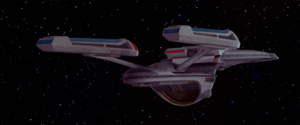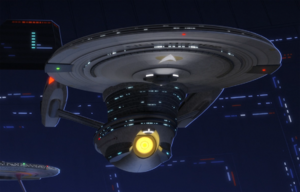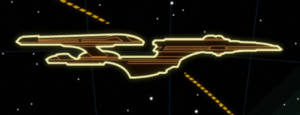Difference between revisions of "Obena Class"
CrimsonTacit (talk | contribs) m (Categories) |
m (Category updates.) |
||
| Line 45: | Line 45: | ||
| aux = | | aux = | ||
| msd = | | msd = | ||
| playable = yes | |||
}} | }} | ||
The '''''Obena''-class explorer''' was developed in the years following the Dominion War to champion [[Federation]] interests in diplomacy and exploration as the galaxy returned to a state of peace. A hull consciously designed with similar lines to the classic [[Excelsior Class|''Excelsior'']] makes the sight of her stir the memory of [[Starfleet|Starfleet’s]] golden years, and she is capable of performing deep-space missions of exploration like her predecessors. But above all she is a vessel intended to be seen: to travel Federation borders and visit Federation neighbours, and do the necessary work to rebuild a war-torn galaxy and its relationships. | The '''''Obena''-class explorer''' was developed in the years following the Dominion War to champion [[Federation]] interests in diplomacy and exploration as the galaxy returned to a state of peace. A hull consciously designed with similar lines to the classic [[Excelsior Class|''Excelsior'']] makes the sight of her stir the memory of [[Starfleet|Starfleet’s]] golden years, and she is capable of performing deep-space missions of exploration like her predecessors. But above all she is a vessel intended to be seen: to travel Federation borders and visit Federation neighbours, and do the necessary work to rebuild a war-torn galaxy and its relationships. | ||
| Line 108: | Line 109: | ||
{{clear}} | {{clear}} | ||
[[Category:Federation Starship Classes (2375–2385)]] | [[Category:Federation Starship Classes (2375–2385)]] | ||
Revision as of 23:48, 22 April 2023
The Obena-class explorer was developed in the years following the Dominion War to champion Federation interests in diplomacy and exploration as the galaxy returned to a state of peace. A hull consciously designed with similar lines to the classic Excelsior makes the sight of her stir the memory of Starfleet’s golden years, and she is capable of performing deep-space missions of exploration like her predecessors. But above all she is a vessel intended to be seen: to travel Federation borders and visit Federation neighbours, and do the necessary work to rebuild a war-torn galaxy and its relationships.
Exploration and Sciences
As with most Starfleet ships of her size, the Obena is a highly capable scientific platform with a wide range of laboratories and facilities for a variety of forms of specialised research. As the exact mission profile varies between ships, the Obena was designed for a custom configuration of scientific laboratories during construction or upon a refit, with a percentage of lab space empty for reconfiguration while in service, a lesson learned from successes in the Galaxy-class. While many Obenas will thus be different, the most common point of variance is whether or not the ship was built for deep-space exploration.
The Obena is not as capable an explorer as more modern and dedicated science ships like the Century or Vesta classes, and is particularly not as capable of operating for as long without support. But her well-rounded profile, mission-configurable space and state-of-the-art sensor arrays on both the primary and secondary hulls make her a good choice for many missions of exploration. With the changing political map of the 2390s, Obenas have been a top choice for scientific missions in regions only recently-opened to the Federation, such as former Romulan territories, where operations are as much a matter of defence and diplomacy as science.
Diplomacy
The Obena is one of the foremost diplomatic platforms of Starfleet, surpassed only by the likes of the Odyssey-class. Designed to ape the appearance of the Excelsior, it was Starfleet’s hope that the mere sight of an Obena would remind friends and enemies of the height of Federation power and generosity alike. While she is more than capable of defending herself in a fraught warzone, the intention of her design is to send the message that the Federation has come to talk, not to implicitly threaten. If an Obena arrives to a negotiation, it is a sign Starfleet is taking the matter seriously, and that it expects - or wants - the eyes of the galaxy upon it.
An Obena boasts extensive guest and VIP quarters and conference spaces, and can usually make office space available for diplomatic staff aboard. These facilities are located close to the ship’s amenities to allow guests and delegates to spend their time aboard in comfort. While an Obena can easily perform first contact missions, she is best-suited to hosting negotiations or ferrying delegates among powers who understand the prestige of what she symbolises.
Engineering
From a distance, it would be easy to assume that the Obena is merely a modernized Excelsior-class heavy cruiser like the Excelsior II, but up close her larger scale is very apparent. At 800 meters long and with 40 decks, the Obena is much longer than the Galaxy and Sovereign-class explorers she is derived from, but has roughly the same internal volume of the Sovereign, or about 80% the volume of the Galaxy. Her large size gives the Obena plenty of space for powerful engines, enormous cargo bays, and other facilities that make her well-suited to humanitarian projects.
A major deviation from the Excelsior that inspired her is the configuration of the Obena’s impulse engines. The ship’s main impulse engines are on the aft end of the saucer section, and are among the largest units in Starfleet service. Unusually, they have thrust apertures that point directly port and starboard, which can be very useful to help the ship maintain station-keeping or to perform abrupt turns. In addition to these primary impulse engines, there is a secondary impulse assembly directly aft of the bridge, and four tertiary impulse jets on sides of the secondary hull. These impulse engines give the ship tremendous sublight maneuverability, useful as a way of multiplying her tactical ability by being able to keep her weapons locked on a target or to escape when out-gunned.
The ship’s warp drive system was borrowed directly from the Sovereign to save on design time and to have commonality for maintenance purposes. While the nacelles’ exterior styling is slightly different, their interior components are identical, which gives the Obena the same top speed as her elder sister.
The Obena has a single shuttle bay on the stern, which is capable of handling a dozen shuttles and a handful of runabouts, which is less than most other explorer-type starships, but significantly simplifies auxiliary craft operations. In addition, the Obena is equipped with a captain’s yacht docked in a dedicated bay just above the planetary sensor dome in the saucer section.
Obena-class starships are capable of routine separated flight mode.
Tactical
The Obena is equipped with state-of-the-art defenses, allowing her to fill the same role as other explorers during combat situations: a large, well-armed capital ship meant to form the center of a formation or handle smaller trouble spots on her own.
Torpedo coverage is provided by two standard-fire aft torpedo launchers between the impulse engines, and a single forward-firing quantum torpedo turret. As with all Starfleet torpedo launchers, these are capable of firing at targets not precisely in the arc of the launcher, thanks to smart ordnance.
The Obena has a moderate loadout of phaser arrays for a ship of her size, especially compared to the highly-tactical Sovereign, but this makes her well-suited to her diplomatic and exploratory duties. For any foes thinking she is a soft target, they will be surprised when they find the Obena able to maneuver and turn like a vessel half her size to bring her fewer but powerful weapons to bear. This can make her combat performance highly reliant on the experience and skills of her captain and their familiarity with her capabilities.
Shipboard Life
With one of the largest crews on a Starfleet ship, dwarfed only by the mammoth complements of the Galaxy or Odyssey, an Obena is a busy and active ship to serve on. They are popular and prestigious assignments, and particularly highly-sought by officers interested in diplomatic operations or working to the immediate good of Federation territories. Because of the highly-symbolic nature of these ships, their crews are carefully-selected and commanding officers are usually experienced captains trusted to make serious decisions with possibly high-profile ramifications. The desirability of the assignment and the sense of high responsibility and strong mission purpose among the crew help foster a close atmosphere, despite the large roster. Senior officers tend to serve on an Obena-class for many years as one of the high points of their career, and their immediate subordinates sometimes choose to continue as deputies rather than move on to become department heads on less-prestigious and perhaps less-exciting assignments.
Accommodation standards are high, with most officers enjoying solitary quarters and all but the most junior aboard given at least their own room with a shared living space. Crewmen rarely share quarters with more than one other. On-board facilities are luxurious and comfortable, with multiple crew messes and a private lounge for the senior staff and guests. The main lounge is a particular feature of an Obena, as it not only serves as the major social hub for the crew but will host guests and diplomatic delegates. It is thus expected to represent the prestige and luxury of the Federation, and often has a design selected by the commanding officer to reflect their ship. Further entertainment is provided by multiple holodecks, an arboretum in the secondary hull with a blend of holographic green space and real plant-life, and two recreation halls for gatherings or sporting events.
Due to their varied operations, Obenas may include civilian contractors on their roster. Crewmembers may request to bring families aboard, with permission granted at the discretion of the commanding officer and dependent on the mission profile. Such ships do not tend to have a large enough civilian population to share the ‘floating city’ feeling of a Galaxy or Odyssey, and family members tend to build a close-knit community with other crewmembers’ dependents, aware of the responsibility of living aboard a starship and committed to supporting the crew.
Medical facilities are state-of-the-art to reflect the Obena’s use in humanitarian missions, and include holographically-configurable space that can operate as a pop-up shelter for disaster relief, or otherwise be reserved for cargo or mundane operations.
Class History
The decade between the Borg attack of 2366 and the end of the Dominion War was an era of unprecedented militarisation for Starfleet reflected in their starship design. Even the development of the new flagship was impacted, with the Sovereign-class the most tactically capable starship ever built by the Federation. The end of the war left many corners of the Alpha and Beta Quadrants devastated, with diplomatic relationships altered or strained and worlds and governments in desperate need of rebuilding. Starfleet was eager to meet these challenges and return to its primary mandate of exploration and diplomacy, and needed new ships to perform these missions.
The earliest designs for the Obena had been proposed in the development of the Sovereign, but dismissed as militarisation demanded a more tactical profile. Now R&D returned to these designs, the modernisation of the Excelsior-class considered a more positive design choice by a Starfleet keen to evoke halcyon days of peace. The Obena could be more quickly and easily built than the massive Galaxy-class, with a reduced tactical profile than the Sovereign allowing greater scientific and diplomatic facilities, without the exclusive focus on deep-space operations far from Federation territory of the Luna-class.
The similarities to the Excelsior were mostly cosmetic, the Obena required to be a larger ship to impress friends and enemies alike, and fulfill missions of exploration and humanitarian aid. Plans drew on lessons in ship design that Starfleet had mastered in its rapid development of the previous decade to enable a relatively swift development period. The Obena was not intended to push the envelope, but rather be equipped with the best technology already implemented and perfected.
The project was greenlit in early 2376, and the work already done on the initial proposal and the use of refined and reliable technology allowed rapid progress. The USS Obena was launched in mid-2379 to conduct a shakedown cruise, and was commissioned in early 2380. Construction on more ships began at once, with Obenas going on to play a key role in Federation diplomacy and humanitarian operations of the early 2380s. While capable of performing deep-space exploration, Starfleet was loath to send its newest figurehead far from borders, and Obena captains reported mixed experiences. Some visited neighbouring powers to rebuild key relationships and help those in the galaxy most in need, while others spent long months on cruises they described more as morale-boosting exercises than truly essential.
Word of the Romulan Supernova and Starfleet’s rush to aid evacuation gave the Obenas a significant role in the initial response; they were big ships capable of venturing into sometimes volatile regions and lending support to stricken and troubled worlds. While this ended with the Attack on Mars and the Federation’s withdrawal of support for the Romulan Star Empire, these years largely carved out the Obena’s role for the next decade.
With morale shattered across the Federation, Starfleet turned inward, conducting fewer missions of exploration. The Obena became an essential part of its operations, either maintaining vital peace treaties with neighbours large and small, or maintaining stability in fringes of the Federation no longer receiving the same level of support to which they had grown accustomed. In some cases, the arrival of an Obena meant an influx of supplies and supportive infrastructure. In others, Starfleet seemed to think that sending a ship that looked like the golden days was enough, and to particularly embittered citizens of Federation border worlds, the Obena has become known as ‘the empty promise.’
Obena-class ships have been in production for the past twenty years, though construction slowed with the development and massive rollout of the Inquiry-class. Despite the Obena’s age, it remains a respected Starfleet ship-of-the-line.
In Play
- Think of an Obena as a Galaxy-lite: still a big capital ship but not as huge, an excellent all-rounder while surpassed by specialist vessels, important but not the absolute apex of prestige. They are fairly numerous, and while the Inquiry is the new backbone of the fleet, the Obena is still a ubiquitous and more diplomatic older sister.
- The similarities to the Excelsior-class were an intentional design choice when Starfleet wanted to harken back to its glory days. Obenas are thus most often found in or near Federation space, working with people who’ll understand their symbolism. If an Obena shows up, Starfleet is taking the matter seriously.
- Obena captains and senior staff are often seasoned personnel. The assignment may be the career height for officers who want to get their hands dirty with interstellar affairs, though those looking for regular deep-space exploration far from home will often move on after a few years.


